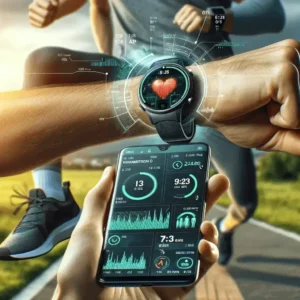The advent of fitness trackers and smartwatches marks a significant milestone in personal health monitoring. These Wearable Fitness Technology devices have revolutionized how we track and manage our health, offering many insights that were once difficult to measure outside of a clinical setting. From monitoring daily physical activity to analyzing sleep patterns and heart rate, these gadgets have become integral to modern health consciousness.
Key Aspects of Wearable Fitness Technology:

Activity Tracking:
- Tracks steps, distance, and calories burned.
- Provides real-time feedback on physical activity.
- Encourages users to achieve daily movement goals.
Heart Rate Monitoring:
- Offers continuous heart rate tracking.
- Essential for monitoring cardiovascular health.
- Useful for maintaining optimal workout intensity.
Sleep Analysis:
- Monitors sleep patterns, including duration and quality.
- Crucial for understanding and improving sleep health.
Fitness Goal Setting:
- Allows users to set and track specific fitness objectives.
- Aids in maintaining a structured and goal-oriented fitness regimen.
Health Alerts:
- Issues notifications for health anomalies, like abnormal heart rates.
- Promotes proactive attention to health concerns.
Smartphone Integration:
- Seamlessly connects with smartphones for data analysis and notifications.
- Enhances the user experience by integrating with daily technology use.
Customization and Personalization:
- Offers various options for appearance and display customization.
- Makes the device a fashionable accessory, not just a health tool.
Benefits:
- Enhanced Self-Awareness: By providing immediate feedback on physical activities and health metrics, wearables help increase self-awareness regarding fitness and health habits.
- Motivational Tool: The goal-setting and tracking functionalities serve as a motivational tool, encouraging users to pursue a more active lifestyle.
- Convenient Health Tracking: Wearables offer a convenient and unobtrusive way to monitor vital health statistics regularly.
Also read 17 Top Vitamin E-Rich Foods for Vegetarians: Maximizing Health Benefits
Challenges:
- Data Accuracy Concerns: While these devices provide useful insights, there are concerns about the accuracy of the data, especially in less advanced models.
- Data Privacy Issues: The collection and handling of personal health data raise privacy concerns, with questions about how this data is stored, used, and potentially shared.
- Over-reliance on Technology: There’s a risk of becoming overly reliant on these devices for health insights, potentially overshadowing an intuitive understanding of one’s body and health.
The Impact on Personal Health Management
Wearable fitness technology has significantly impacted personal health management. It has democratized health monitoring, making it accessible to the average person. This technology empowers individuals to take control of their health, offering insights that enable informed health decisions. However, users need to understand the capabilities and limitations of these devices, using them as tools to complement, not replace, professional medical advice and personal intuition about one’s health.
FAQs about Wearable Fitness Technology
Q: How accurate are fitness trackers in measuring steps and calories?
A: Fitness trackers are generally accurate in measuring steps and calories. However, precision can vary based on the model and technology used.
Q: Can wearable devices replace medical devices for heart rate monitoring?
While wearable devices offer useful insights, they are not medical devices and should not be used as a replacement for professional medical advice.
Q: How do wearable fitness devices contribute to sleep quality improvement?
These devices track sleep patterns, helping users identify and modify behaviours for better sleep quality.
Q: Are there any risks associated with continuous health monitoring through wearables?
Continuous monitoring is generally safe, but users should be mindful of data privacy concerns and avoid over-reliance on these devices for health management.
Conclusion
Wearable fitness technology is a significant stride forward in personal health management. It brings many benefits, from enhanced awareness to motivational support in pursuing a healthier lifestyle. However, as with any technology, it comes with challenges, particularly regarding data accuracy and privacy. As these devices evolve, they promise to become even more integral to our daily lives, offering sophisticated and personalized health insights.


